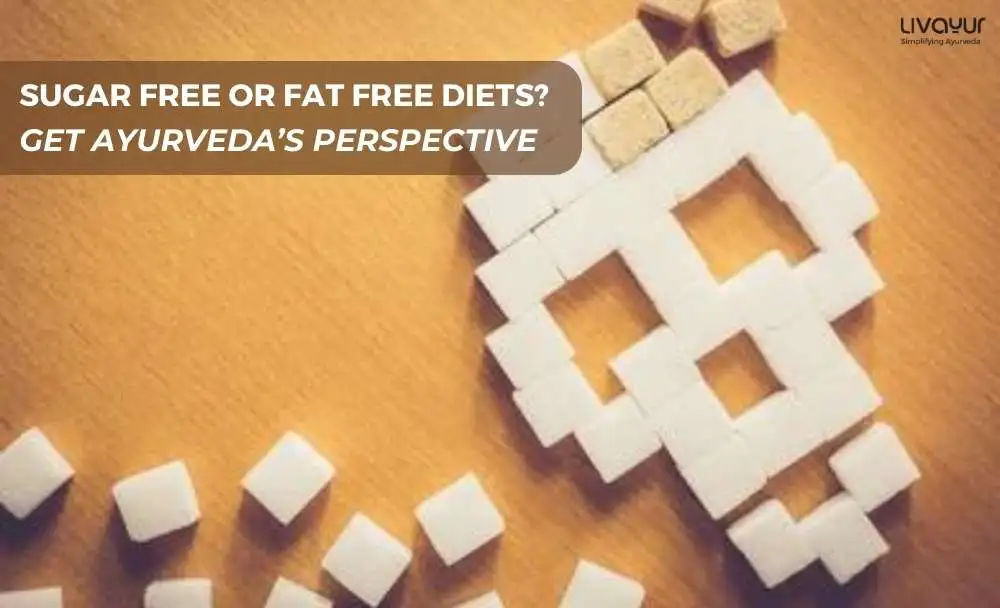
For decades, fats and fatty foods were demonized and given a bad reputation in the West. People were advised to follow low-fat diets to maintain a healthy weight, fight obesity, and lower the risk of heart disease. This has always been at odds with the fundamental teachings of Ayurveda that emphasize balance and moderation in all areas of life, including your diet.
Ayurvedic diets emphasize balanced nutrition with adequate foods from all food groups, including carbohydrates, protein, fat, and sugars. While these diets are not restrictive, Ayurveda has stressed eating natural or whole foods rather than processed foods. [3] This is now borne out by evidence, which shows that ultra-processed diets are linked to a higher risk of obesity, diabetes, and other lifestyle disorders. Now, what’s the common thread in all of these processed foods? They’re all loaded with trans fats and sugar.
Before we look at the findings of a study on swapping fat for sugar, let’s take a closer look at how sugar affects your body.
How does sugar affect your body?
Contrary to popular belief, fat intake is not what makes us fat or obese; it is sugar that is the real culprit. Fat vs sugar is an age-old debate, and it is necessary to understand the reality before deciding what we should eat and shouldn’t.
The confusion about fatty and sugary foods is the result of decades of propaganda and dubious studies funded by the sugar industry, with fat emerging as the scapegoat. Therefore, you must rethink your decision before setting out on the fat swap mission.
As more credible evidence has been accumulated and made available in recent years, it has become clear that sugar can make you fat, also increasing the risk of various lifestyle diseases. Here, it is crucial to understand why sugar makes you fat. According to scientific evidence, sugar makes you fat because sugar is broken down rapidly, leading to dramatic spikes in blood glucose or sugar, triggering food cravings and overeating. Excess glucose that is not used as fuel is also stored in the body as fat. [5]
Does natural sugar make you fat?
Remember that when we talk about sugar fat, we specifically refer to table sugar and sugar added to processed foods and beverages, from candies and cookies to ketchup and colas.
As pointed out in Ayurveda, natural sugars from fresh fruits and veggies are healthy and should comprise the bulk of your diet. Thus, as an answer to the question ‘Does natural sugar make you fat?’,it can be said that complex carbs in natural sugar-based food sources like fresh fruits and veggies are broken down slowly and, therefore, do not cause dramatic blood sugar spikes. [4]
In other words, the emphasis is on balance with adequate protein and fat intake, which also impacts blood sugar regulation and hunger. This is because proteins and fats are broken down at a slower rate, helping stabilize glucose levels and controlling appetite.
Now that you’ve understood the risks of excess sugar intake, it would help to look at study findings that demonstrate how sugar is worse than fat.
Which option is better- low-fat diets or swapping fat for sugar?
The table below will let you get a sneak peek into the sugar vs fat duel:
| Aspect | Excessive Sugar | Various Types of Fats |
| Role in Body | Converts to stored fat, lacks nutritional value | Varied impact: essential for vitamins, immunity, energy |
| Presence in Foods | Common in snacks, cereals, drinks, smoothies, ready meals | Found in animal products, oils, nuts, seeds |
| Specific Health Risks | Insulin resistance, dental caries, heart risks, addictive | Influence on cholesterol, vitamin absorption, immunity |
| Recommended Management | Limit added sugars, moderate natural fruit sources | Moderation: balance different types for overall health |
| Health Impact | Increases risk of insulin resistance, leading to diabetes | Varied positive effects on health, immune support, energy, skin hydration |
| Dental Health | The main contributor to tooth decay (caries) | Role in improving immunity, particularly saturated fats |
| Cardiovascular Health | Raises bad cholesterol (LDL), blood glucose, insulin – risks for heart disease | Influences good cholesterol (LDL), Omega-3, and Omega-6 impact |
| Addictive Nature | Triggers dopamine release, causing addictive behaviors | No addictive properties found |
| Weight Management | Excess sugar stored as fat, contributes to obesity | Provides satiety, aids in weight maintenance |
| Essential Nutrient Absorption | Essential for fat-soluble vitamins (A, D, K, E), vital for brain health | Critical for immunity, skin health, and vitamin absorption |
| Caloric Energy | Provides quick energy, lower caloric content per gram | Provides high caloric energy, aiding in satisfaction |
Source:
Thus, we see that contrary to popular beliefs, fats are not the primary culprit in health issues; rather, it is excessive sugar intake that poses significant risks. The research, spotlighting the effects of exchanging fat for sugar, underscores the importance of food quality.
Embracing healthier fats from natural sources, like monounsaturated and polyunsaturated sources, yields promising health benefits, enhancing heart health and reducing disease risks. This study shows Ayurveda’s emphasis on balanced nutrition and whole, unprocessed foods. Reflecting on this synergy, it is clear that integrating these timeless Ayurvedic principles into modern lifestyles can pave the way for improved health outcomes.
While Ayurveda emphasized balanced nutrition for health, western medicine recommended low-fat diets for decades. Fortunately, researchers who studied the effect of such diets found that low-fat diets did not offer any significant weight loss benefits, nor did they lower the risk of heart disease or cancer. On the contrary, several studies have shown how sugar can damage your health. [6] Keeping those findings in mind it can be said that it is definitely not a wise decision to swap fat for sugar.
How did the study confirm Ayurveda’s basic concept?
The study, which appeared in the Journal of the American Medical Association, was insightful and revelatory in that it confirmed the truth in the Ayurvedic concept of food. Ayurveda says that it is not a food group itself that is good or bad, but the quality of the food. The same idea was highlighted by the study which declared that simple carbs like sugar and refined grains and saturated or trans fats from fast food and red meat were found to be unhealthy. [1]
Replacing such processed foods and sugar with healthy monounsaturated and polyunsaturated fats was found to improve heart health, reduce the risk of cancer and neurodegenerative disease, and lower the risk of any kind of death by as much as 27 percent.
Such healthy monounsaturated and polyunsaturated fats can be obtained from a variety of natural food sources, including olive oil, avocados, nuts, and seeds. Similar findings have been documented in several other studies that emphasize the importance of healthy fats like omega-3 fatty acids. [2] Just make sure to follow the simple Ayurvedic rule of eating in moderation if you want to enjoy any of the health benefits of swapping fat for sugar.
FAQs
1. Can the body convert fat into sugar?
Yes, in times when your carb intake is limited, the body employs a process called gluconeogenesis to produce glucose from sources like fat and protein. This remarkable process primarily occurs in the liver, which serves the crucial role of regulating and sustaining a stable glucose level in your bloodstream.
2. Can sugar be replaced with fat?
Yes, substituting sugar with fat can indeed maintain the taste and texture of food products. However, it is essential to note a significant difference in calorie content: while sugar provides 4 calories per gram, fat delivers 9 calories per gram. This substitution leads to a considerable rise in the total calories present in the product due to the higher calorie content of fat.
3. How much of the body’s fat can be converted into glucose?
Roughly 5-6% of triglycerides, which constitute the body’s fat, can undergo conversion into glucose in humans. This limitation arises from the structure of triglycerides, comprising a 3-carbon glycerol molecule combined with longer-chain fatty acids, usually 16 or 18 carbons long.
4. What are the effects of abstaining from sugar for two weeks?
Participants in a two-week sugar-free experiment reported several positive health changes. These included improvements in cholesterol levels, better blood pressure readings, and enhanced cardiovascular function. Also, they observed reduced inflammation, mitigating the risk of chronic diseases and contributing to overall better health.
5. Which burns more quickly for energy: Sugar or fat?
The body can utilize both sugar and fat for energy. Sugar, however, is a faster and more readily accessible source, so it is usually the primary choice for immediate energy needs. Yet, the body’s glycogen stores, where sugar is stored, have limits. In situations like fasted cardio, when these stores are depleted, the body turns to fat as an alternative energy source.
Conclusion
Thus, we see that contrary to popular beliefs, fats are not the primary culprit in health issues; rather, excessive sugar intake poses significant risks. The research, spotlighting the effects of exchanging fat for sugar, underscores the importance of food quality. Embracing healthier fats from natural sources, like monounsaturated and polyunsaturated sources, yields promising health benefits, enhancing heart health and reducing disease risks. This study shows Ayurveda’s emphasis on balanced nutrition and whole, unprocessed foods. Reflecting on this synergy, it is clear that integrating these timeless Ayurvedic principles into modern lifestyles can pave the way for improved health outcomes and an obesity-free life.
Disclaimer
This article has been written from a health and wellness perspective and is not a substitute for medical advice.
References
- The effects of processed foods on the human body
- Monounsaturated Fat vs Saturated Fat: Effects on Cardio-Metabolic Health and Obesity
- Balanced Diet in Ayurveda for Ideal Health in Present Era
- Replacement of Refined Sugar by Natural Sweeteners: Focus on Potential Health Benefits
- Conversion of Sugar to Fat: Is Hepatic de Novo Lipogenesis Leading to Metabolic Syndrome and Associated Chronic Diseases?
- Sugar consumption, metabolic disease and obesity: The state of the controversy
















